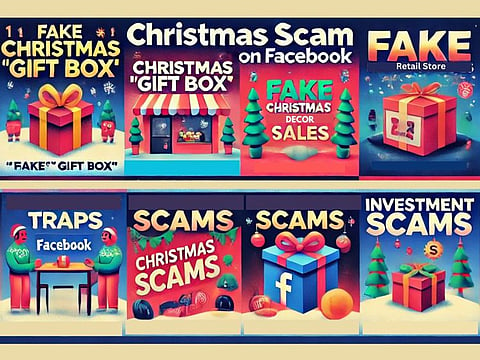Beware the ‘10 Facebook scams of Christmas’: Red flags to watch for
How to stay safe on Facebook this holiday season

As Christmas draws near, it’s not just holiday shoppers bustling with activity. Scammers are also hard at work, devising elaborate schemes to take advantage of the festive season.
With many turning to Facebook for holiday shopping, the platform has become a hotspot for sophisticated scams that can leave unsuspecting users empty-handed or worse, compromised.
Fraudsters create fake promotions for holiday gift boxes, luring victims with promises of huge discounts or free gifts. “Win a prize!” scams pull users into filling out surveys or paying fees, harvesting sensitive data in the process.
#1. Fraudulent holiday decoration sales
The holiday season is a prime time for scammers to prey on shoppers looking for festive decorations at great deals. They advertise non-existent or subpar holiday decorations at low prices.
Here's how to identify these scams and protect yourself from falling victim. If something seems off or too good to be true, it probably is. Take extra precautions or avoid the seller entirely.
These are the top Facebook scams to watch out for:
#2. Fake Christmas 'gift box' promotions
Fake Christmas "gift box" promotions are a common scam designed to exploit the holiday spirit of giving and excitement around festive deals. While they may appear harmless or enticing, these scams pose several significant dangers: Personal data theft, financial fraud, malware distribution, and loss of time and money.
Many fake gift box schemes request small “processing” or “shipping” fees, tricking victims into sharing their credit card or bank information. This can lead to unauthorized charges or outright theft from accounts.
Clicking on links in these promotions can download malware or viruses onto your device. These harmful programs may spy on your activities, steal sensitive information, or lock your files for ransom (ransomware).
Note: Fake gift box scams often masquerade as promotions from trusted brands, leveraging their reputation to gain credibility. Victims may unknowingly trust and engage with the scam because of the perceived legitimacy.
#3. Fake online stores
These scams often feature ads or posts promoting unbelievable deals from bogus stores that mimic trusted brands. Shoppers either receive subpar goods or nothing at all.
#4. Counterfeit products | retail coupons
Fake coupon schemes designed to exploit shoppers seeking holiday discounts.
#5. Facebook Marketplace fraud
From fake listings to demands for deposits, scammers target buyers with attractive offers that don’t deliver.
#6. Subscription traps
“Free trial” ads for products like beauty items often hide recurring, costly subscriptions in the fine print.
#7. Phishing links and clone websites
This is where scammers use ads or posts with links leading to fake sites designed to steal personal or financial data.
How to spot them:
#8. Overpayment scam
Fraudsters posing as buyers overpay with fake checks and ask for refunds on the excess.
How to spot them:
#9. Rental and vacation property scams
Scammers post attractive property listings, request deposits, then disappear.
#10. Investment scams
Ads promoting resellable products with high returns often lead to nothing delivered.
Meta warning
On Monday, December 9, Meta, the parent company of Facebook, WhatsApp, and Instagram, announced a drive to combat holiday shopping scams as part of its worldwide anti-scam awareness campaign.
The 2 million deactivated accounts were traced in "scam hubs" located in Cambodia, Myanmar, Laos, and the Philippines, according to Facebook parent firm Meta.
In addition, Meta reported significant enforcement actions in other regions, including the removal of 15,000 phishing URLs in Vietnam and 9,000 in Singapore, highlighting the global scale of scam operations during the holiday season. Facebook has over 3 billion monthly active users (as of April 2024) and 2. 11 billion daily active users (DAUs) – meaning 68.85% of monthly users log in daily.
As of April 2024, Facebook has over 3 billion monthly active users (MAUs). Facebook has 2.11 billion daily active users (DAUs), meaning 68.85% of monthly users log in daily.
The largest age group on Facebook is 25–34, making up 29.9 per cent of all active users. The 18–24 age group makes up 21.5 per cent of all active users.



